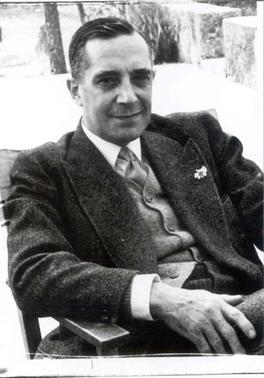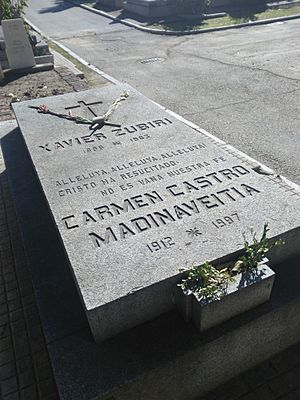Xavier Zubiri facts for kids
Quick facts for kids
Xavier Zubiri
|
|
|---|---|
 |
|
| Born | 4 December 1898 |
| Died | 21 September 1983 (aged 84) Madrid, Spain
|
| Nationality | Spanish |
| Era | 20th-century philosophy |
| Region | Western philosophy |
| School | Continental philosophy Madrid School |
|
Main interests
|
Metaphysics |
|
Notable ideas
|
Noology |
|
Influenced
|
|
Xavier Zubiri (born December 4, 1898 – died September 21, 1983) was an important Spanish philosopher. He was part of a group called the Madrid School. This group included other thinkers like José Ortega y Gasset. Zubiri's ideas are sometimes called "materialist open realism." He tried to explain old ideas about metaphysics (the study of reality) using modern science.
Contents
Xavier Zubiri's Early Life and Studies
Xavier Zubiri first studied philosophy and religion in Madrid and Rome. He later continued his philosophy studies in Louvain, where he wrote his main paper on phenomenology. This is a way of studying how we experience things.
In 1929, Zubiri was very interested in this type of thinking. He went to Freiburg, even though he was already a professor in Madrid. There, he learned from famous philosophers like Edmund Husserl and Martin Heidegger.
Learning from Scientists
In 1930, Zubiri moved to Berlin. He studied physics, philology (the study of language), and biology there. He lived in a place called Harnack House. This allowed him to meet many important thinkers of that time.
He met people like Albert Einstein, Max Planck, and Erwin Schrödinger. Zubiri had actually met Einstein before, in Madrid, in 1923.
Challenges and Continued Work
When the Spanish Civil War started in 1936, Zubiri moved to Paris. He kept learning and attending classes there. He learned from scientists like Louis de Broglie and Irène Curie.
In 1939, just before France went to war with Germany, Zubiri returned to Spain.
Academic Freedom Issues
Zubiri's philosophy is not very well known outside of Spain and Latin America. This is mainly because he had to leave his teaching jobs in Spain in 1942. This happened because there was not much academic freedom under Francisco Franco's government.
However, Zubiri was able to continue his work as a scholar. His family and friends helped him financially.
Publishing and Recognition
Zubiri wrote many articles for Spanish magazines like Cruz y Raya and Revista de Occidente. After he left the universities, he did not publish as much in official academic journals. But he still published many books and research papers.
At first, his work was not well received by other academics in Spain. This was mostly due to the political situation under Franco. But Zubiri's connections with scholars like Ignacio Ellacuría helped his ideas become well known in Latin America. His ideas are still being developed there.
Recently, Spanish academics have started to see how important Zubiri's life and philosophy are.
International Recognition
Zubiri did not have much contact with universities in English-speaking countries. He visited the United States only once. This was on October 2, 1946, at Princeton University. There, he gave a lecture in French about "The real and mathematics—A philosophical problem."
Some of Zubiri's books have been translated into English. These include "On Essence" (1980) and "Sentient Intelligence" (1999).
Zubiri also received honors from other countries. In 1979, the German government gave him an award called the Order of Merit of the Federal Republic of Germany. He received this for his books "Nature, History, God" (1954) and "On Essence" (1962). His work has also been translated into French, German, Italian, and Portuguese.
See also
 In Spanish: Xavier Zubiri para niños
In Spanish: Xavier Zubiri para niños
 | Delilah Pierce |
 | Gordon Parks |
 | Augusta Savage |
 | Charles Ethan Porter |


